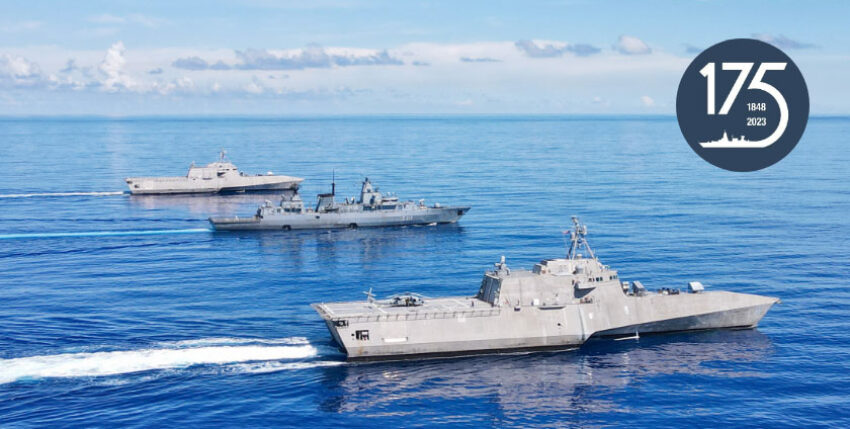After the Indo-Pacific deployment of the frigate BAYERN, the desire for a further presence far from home has fallen asleep again for the time being. China and Russia, on the other hand, are stepping up their commitment in this direction.
The oceans on which navies operate not only divide. They also connect - without the lines of communication at sea, globalisation would not have been possible. Co-operation between navies manifests the relationship between nations. Joint exercises can be an expression of like-mindedness and even partnership. The presence of naval units conveys messages. Sometimes subtle, sometimes very provocative - in the best sense of the word.
From a political science perspective, the navy is more than just an object of research. The presence of naval units sends a message. With the Indo-Pacific voyage of the frigate BAYERN, Germany underlined its commitment to the region and expressed its solidarity with the advocates of a rules-based multilateral order. A regional and at the same time global signal that Germany is also in favour of freedom of navigation in disputed waters.
The voyage of the ADMIRAL GORSCHKOW, a Russian Navy frigate, which attracted little public attention, is another example of the use of naval units as emissaries. Memorable events occurred during her voyage. She encountered Chinese, Iranian and South African naval units during two trilateral manoeuvres. Port calls in Djibouti and Jeddah were also significant.
The flight of the ADMIRAL GORSHKOV carrying the hypersonic Zircon missile, which has been declared a long-range test, is more than just a weapons display. It is visible proof that the Kremlin is able to maintain its international military relations despite the strain placed on its armed forces and its economy by the war in Ukraine. And that Moscow's isolation, which the Western community has been longing for after the illegal invasion of Ukraine, is not bearing the expected fruit in the global South. Beyond this demonstration, the exercises and harbour visits mark the creeping change that is taking place below the perception threshold of the general public.
Regional observers have noted an increase in the Russian and Chinese naval presence in the Indian Ocean. In the past, Russian naval forces have conducted exercises with Chinese and Iranian units in the northern part of this sea area. Now they have operated together with Chinese forces off South Africa. The Chinese naval forces have a permanent task force in the Gulf of Aden. The Chinese navy has maintained a base in Djibouti since 2017. A military base is emerging on the opposite coast, in Gwadar, Pakistan. In Bur Sudan on the Red Sea, a Russian military base is in the making. Beyond their presence and operational value, these bases will increase Moscow and Beijing's strategic reach in Africa and beyond to the Middle East. So we can see maritime geopolitics being played out before our eyes.
For us, the message behind these developments is that both China and Russia are not perceived in the region as the systemic rivals they are labelled as by the "collective West".
Which brings us back to the opening thought of this section. Contrary to the popular cliché, the Chinese and Russian navies are actually ambassadors in blue. Both Moscow and Beijing use the deployment of naval units as a strategic means of communication. Berlin makes little use of this, apart from the voyage of the BAYERN. There have certainly been moments in the past when naval units have made their mark. The constant participation of German naval forces in NATO task forces is an expression of our alliance solidarity. The spontaneous display of a banner with the inscription "We stand by you" by the German destroyer LÜTJENS when the USS WINSTON CHURCHILL passed on 14 September 2001 stood (and still stands!) for solidarity and cohesion.
For the next 175 years of the German Navy, it would be desirable for German maritime thinking to develop further in terms of strategic communication. If Germany has messages to spread, then the navy is a "continuation of politics by other means". The same applies to other branches of the armed forces - but this is about the navy's birthday. With the deployment of a naval unit and its presence, the willingness to underpin principles formulated on patient paper with realpolitik becomes tangible.
Dr Sebastian Bruns is a Senior Researcher at the Institute for Security Policy at Kiel University (ISPK) and was previously a McCain-Fulbright Visiting Professor at the US Naval Academy in Annapolis, Maryland. Captain (ret.) Hans-Uwe Mergener is a naval journalist for the Tamm Media Group and has been a Senior Non-Resident Fellow at the Institute for Security Policy at Kiel University (ISPK) since March 2023.
Sebastian Bruns and Hans-Uwe Mergener










